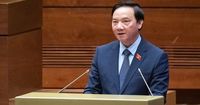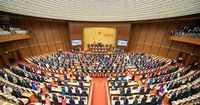On May 7, 2025, Deputy Chairman of the Committee for drafting amendments and supplements to a number of articles of the 2013 Constitution, Nguyen Khac Dinh, presented a draft resolution to the National Assembly aimed at amending and supplementing various provisions of the Constitution. This significant move comes in the wake of the National Assembly's earlier decision to amend the Constitution through Resolution No. 194/2025/QH15.
The proposed amendments are designed to ensure the absolute, comprehensive, and direct leadership of the Communist Party, aligning with the Party's political platform and regulations. The draft resolution includes two main articles: Article 1 comprises eight clauses that revise several provisions concerning the Vietnam Fatherland Front and socio-political organizations, as well as administrative units and local government organizations, while Article 2 outlines three clauses related to the effective date and transitional provisions.
One of the central proposals is to clarify the core role of the Vietnam Fatherland Front. The draft suggests amending Article 9 to better define the position, functions, organizational principles, and operations of the Front, ensuring that it remains the central organization for national solidarity. Additionally, it stipulates that the Central Committee of the Vietnam Fatherland Front will have the authority to submit draft laws and ordinances, as outlined in clause 1 of Article 84 of the 2013 Constitution.
In regards to labor representation, the draft also proposes changes to Article 10, affirming that the Vietnam General Confederation of Labor is a socio-political organization representing the working class and laborers, directly under the Vietnam Fatherland Front. This amendment aims to enhance the Confederation's role in representing workers at the national level in both labor relations and international trade union relations, reflecting the context of Vietnam's economic integration.
On the administrative structure, the Committee suggests only general provisions for the delineation of administrative units within Vietnam, as specified in Article 110. This includes provinces, centrally-run cities, and various administrative units beneath them, as well as special administrative-economic units established by the National Assembly. The proposal indicates that the National Assembly will regulate the types of administrative units, along with the procedures for establishing, dissolving, merging, and adjusting administrative unit boundaries.
Furthermore, the draft resolution proposes amendments to Articles 111, 112, and 114 to define local government organizations, specifically the People's Council and the People's Committee, without using the term 'local government level'. It also suggests that the Chief Justice of the People's Court and the Head of the People's Procuracy will not be subject to questioning by People's Council deputies, aligning with the organizational structure of local state agencies post-arrangement.
As for the effective date of the resolution, the Committee proposes that it should take effect on July 1, 2025. This date marks the end of operations for district-level administrative units across the country. The draft resolution specifies that during the consolidation of organizational structures following the arrangement of administrative units, there will be no elections for positions such as Chairman or Vice Chairman of the People's Council and the People's Committee in the newly formed administrative units. Instead, appointments will be made by the Standing Committee of the National Assembly and the Prime Minister.
To facilitate the transition, the draft resolution includes a transitional provision that allows for the appointment of officials who may not be deputies of the People's Council to leadership roles within the People's Councils at provincial and commune levels formed after the administrative arrangement.
In light of the significant changes proposed, the Committee has initiated a public consultation process to gather opinions from citizens, sectors, and levels of government regarding the draft resolution. This process began on May 6, 2025, and will conclude on June 5, 2025. The aim is to ensure a democratic and thorough review, utilizing various methods and technology to encourage public participation.
Phó Chủ tịch Quốc hội Nguyễn Khắc Định emphasized the importance of incorporating public feedback into the final draft. He stated, “Based on the opinions of the people and the relevant sectors, the Committee will refine the draft resolution for further discussion and approval by the National Assembly during the meeting on June 24, 2025.” This timeline indicates a commitment to transparency and inclusivity in the legislative process, ensuring that the amendments reflect the will of the people.
As Vietnam navigates these constitutional changes, the emphasis on maintaining the leadership of the Communist Party and enhancing the roles of key organizations like the Vietnam Fatherland Front and labor unions highlights the government's focus on stability and unity amid ongoing social and economic transformations.





